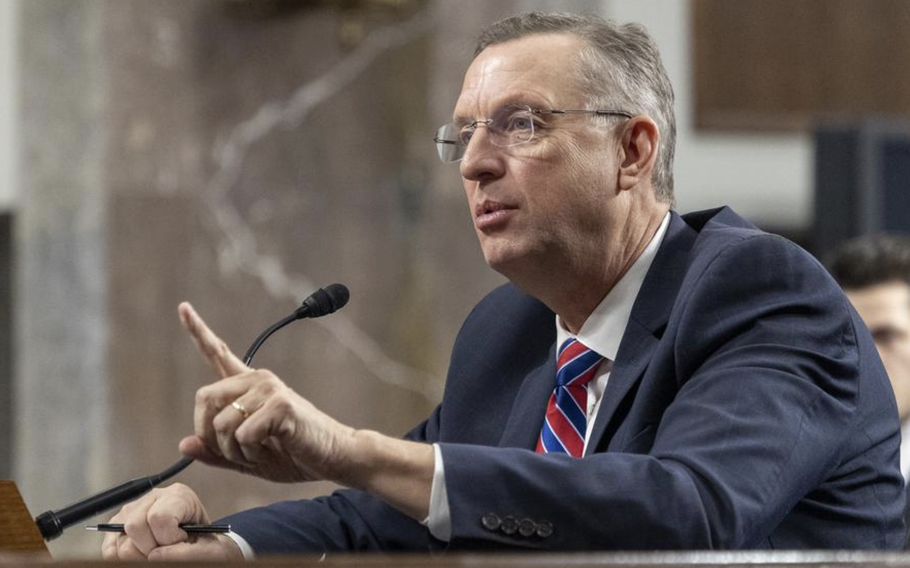
“Too often, unions that represent VA employees fight against the best interests of veterans while protecting and rewarding bad workers,” said Doug Collins, secretary of the Department of Veterans Affairs. Collins announced Aug. 6, 2025, that the VA was ending collective bargaining rights for most of its unionized workers. (Eric Kayne/Stars and Stripes)
WASHINGTON — The Department of Veterans Affairs on Wednesday terminated collective bargaining agreements for most of its more than 350,000 unionized employees, including nurses, food service workers, technicians and janitorial staff.
The VA’s move to end contracts with more than a half-dozen unions prompted rebukes from labor leaders.
“[VA] Secretary Doug Collins’ decision to rip up the negotiated union contract for a majority of its workforce is another clear example of retaliation against [union] members for speaking out against the illegal, anti-worker and anti-veteran policies of this administration,” said Everett Kelley, national president of the American Federation of Government Employees.
In addition to AFGE, other unions affected by the contract terminations are AFL-CIO, National Nurses Organizing Committee/National Nurses United, National Association of Government Employees, National Federation of Federal Employees and the Service Employees International Union.
“Too often, unions that represent VA employees fight against the best interests of veterans while protecting and rewarding bad workers,” VA Secretary Doug Collins said. “We’re making sure VA resources and employees are singularly focused on the job we were sent here to do: providing top-notch care and service to those who wore the uniform.”
But Collins said contracts for an estimated 4,000 VA police officers, firefighters and security guards will remain in place.
About 80% of VA’s 470,000 employees belong to a union, according to USAJOBS, the federal jobs site.
Collins recently had backpedaled on a plan to cut 80,000 workers across the agency after large protests by advocates and workers and complaints from lawmakers. Subsequently, union officials indicated Collins’ decision to end the contracts surprised them.
The VA’s announcement followed President Donald Trump’s executive order in April directing the elimination of collective bargaining at certain federal agencies — including the VA — as a way to enhance national security.
The VA serves as “the backstop health care provider for wounded troops in wartime,” the White House said. “President Trump is taking action to ensure that agencies vital to national security can execute their missions without delay and protect the American people. The president needs a responsive and accountable civil service to protect our national security.”
Across the government, collective bargaining units represent more than half of the 2.1 million civilian employees, according to USAJOBS.
The largest union representing VA employees is AFGE, which has more than 135,000 members. Many of those union members are veterans themselves, according to the organization.
“The real reason Collins wants AFGE out of the VA is because we have successfully fought against disastrous, anti-veteran recommendations” that would have closed rural hospitals, cut VA staff and dismantled veteran health care, Kelley said. “We don’t apologize for protecting veteran health care and will continue to fight for our members and the veterans they care for.”
But VA officials complained Wednesday that employees were using their work hours and VA office space to conduct union activities authorized by union contract.
The VA said it stopped withholding union dues from most employees’ pay checks in April. VA employees spent 750,000 working hours on union activities in 2024, the VA said.
“With no collective bargaining obligations, those hours can now be used to serve veterans instead of union bosses,” the VA said.
The VA also said more than 187,000 square feet of building space at the VA will now be converted for office and clinical use.
“Today’s decision will ensure VA facilities are fully focused on helping veterans get the care and benefits they’ve earned, instead of serving as free regional offices for unions that oppose our efforts to improve VA,” the agency said.